A poster detailing a collaborative project lead by Dr. Phil Starr of UCSF will present the first in-human results of the Summit System at the 18th Biennial Meeting of the World Society for Stereotactic and Functional Neurosurgery (WSSFN). Full poster details here
Closed-Loop DBS
Deep Brain Stimulation research from BRL is on the news!
Prof. Howard Chizeck and students of the BioRobotics Lab have developed a method to deliver targeted treatment to people suffering from Essential Tremors using brain signals. They combined electrodes on top of the brain to sense movement in the parts of the body that experience essential tremor, along with a deep brain electrode, to deliver stimulation only when it’s needed.
Here are a few articles from the news:
Top story on NSF’s Science 360 website (June 29): https://news.science360.gov/files/;jsessionid=442F66BBC864503F62F1748A5018342B Direct link:https://news.science360.gov/obj/story/a3d89254-f882-471e-83e4-f66d3dfe8854/brain-signals-deliver-first-targeted-treatment-worlds-common-movement-disorder
National Science Foundation website: https://nsf.gov/news/news_summ.jsp?cntn_id=242397&org=NSF&from=news
Neuroscience News: http://neurosciencenews.com/essential-tremor-dbs-6992/
Health and Medicine News: http://hmnews.org/research-news/cluster947398100/
E Science News: http://esciencenews.com/sources/newswise.scinews/2017/06/27/brain.signals.deliver.first.targeted.treatment.worlds.most.common.movement.disorder
Jersey Tribune: http://jerseytribune.com/2017/06/27/brain-signals-deliver-first-targeted-treatment-for-worlds-most-common-movement-disorder/
Science and Technology Research News: http://www.scienceandtechnologyresearchnews.com/brain-signals-deliver-first-targeted-treatment-worlds-common-movement-disorder/
Science Daily: https://www.sciencedaily.com/releases/2017/06/170627142832.htm
Neuroethics and Engagement Workshop
Last week two of our BRL PhD students presented at the Neuroscience and Ethics Engagement: From Gray Matters to an NSF Engineering Research Center. Maggie Thompson (EE, left) and Tim Brown (Philosophy, right) participated in the Center for Sensorimotor Neural Engineering workshop, and from their website:
This conference gathers experts in the fields of bioethics and neuroethics to think about ways of engaging ethics and science. The conference will take as its starting point recommendations from the Presidential Commission for the Study of Bioethical Issues report, “Gray Matters: Integrative Approaches for Neuroscience, Ethics, and Society.”
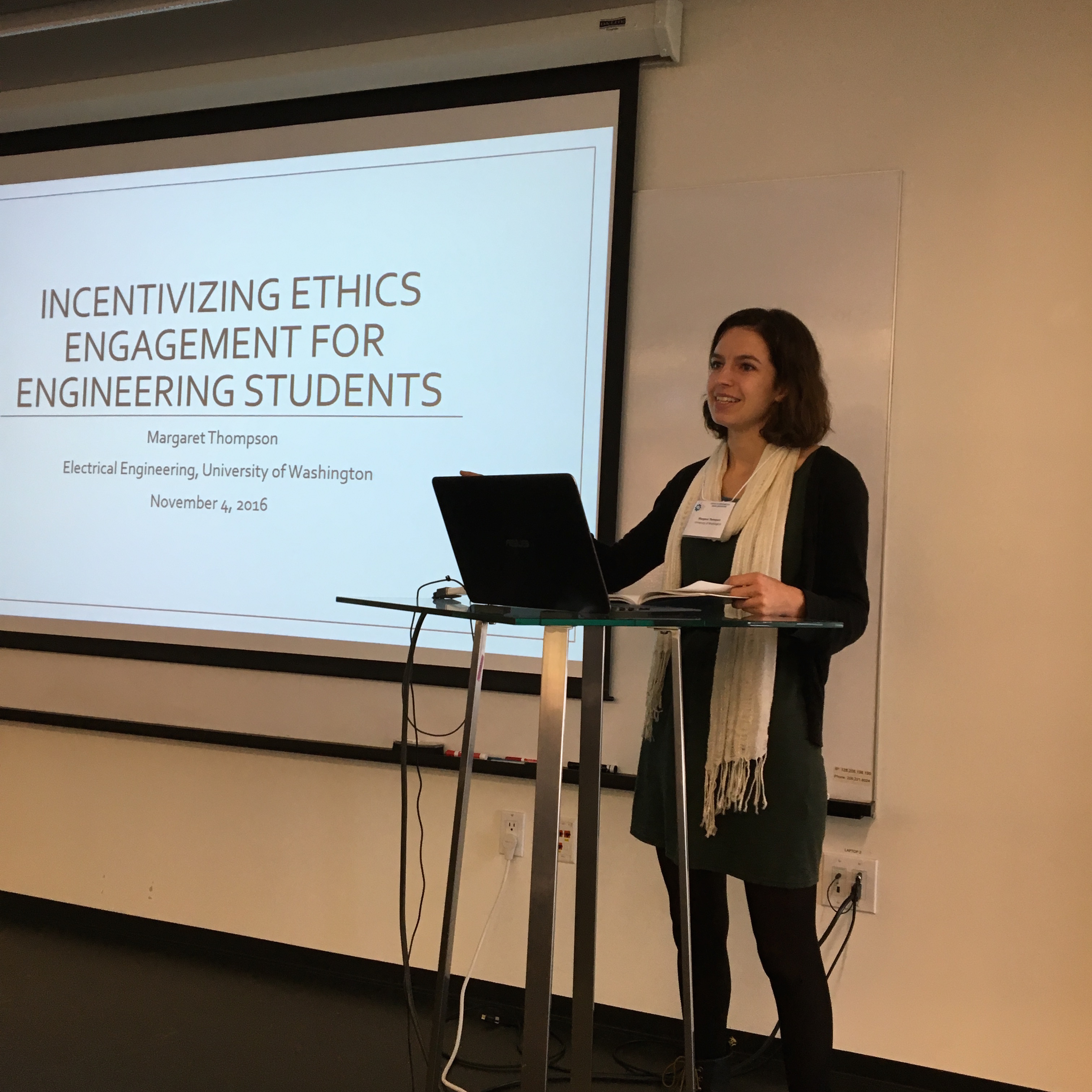
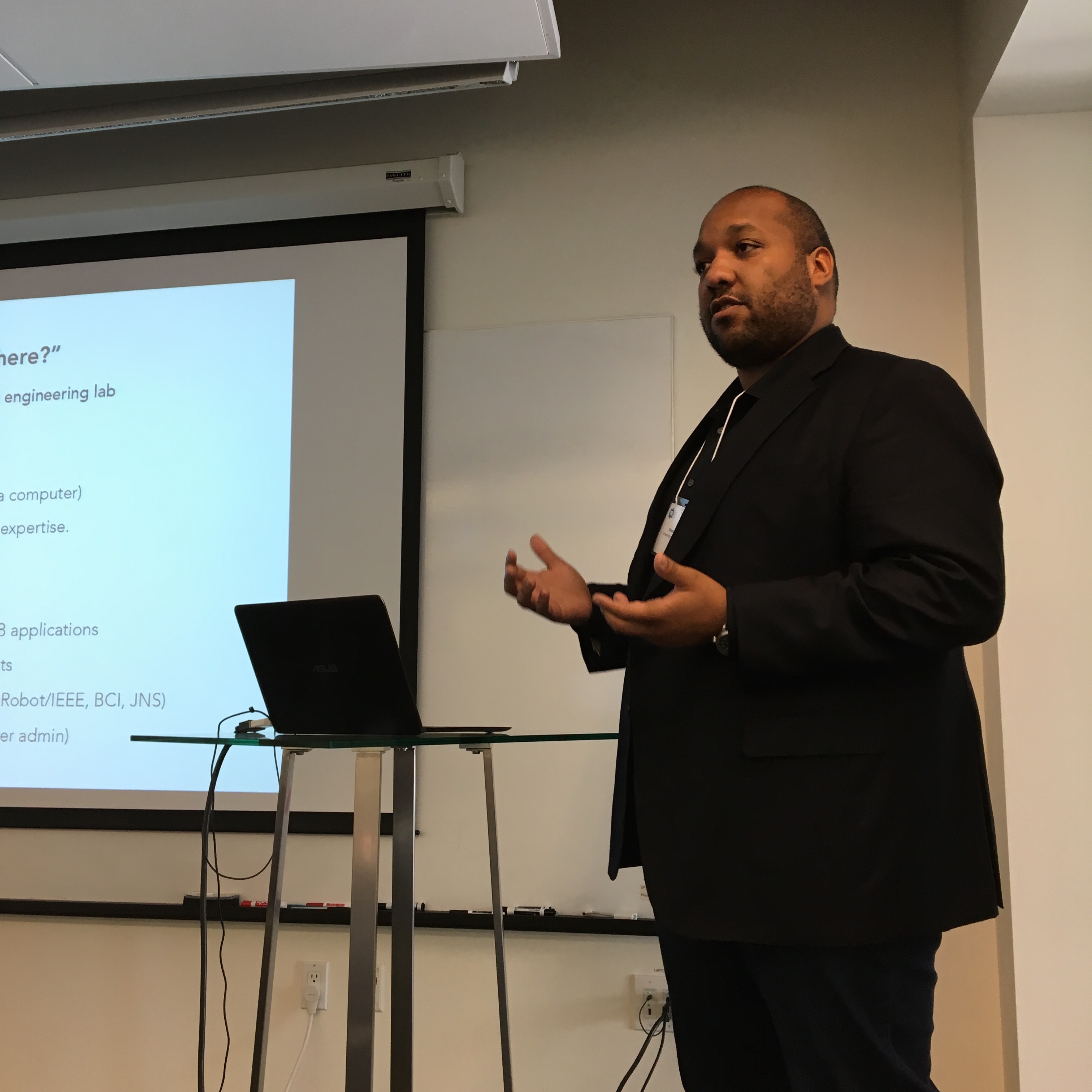
BRL at NeuroFutures
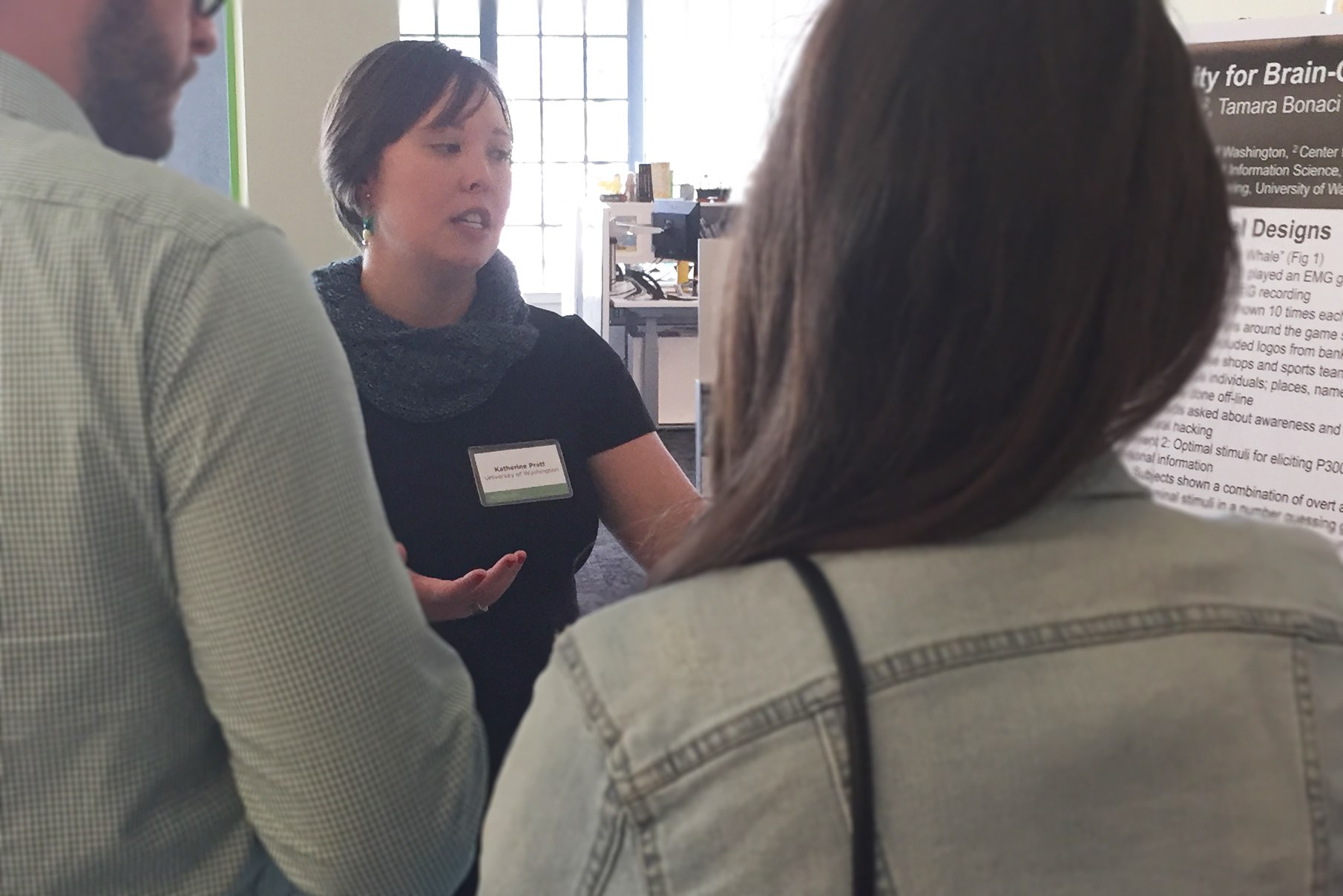 Several BRL members attended NeuroFutures 2016 at the Allen Institute here in Seattle to present posters. Katherine Pratt (pictured right) presented work by herself and BRL alum Tamara Bonaci on the neural security of brain computer interfaces. Other posters were:
Several BRL members attended NeuroFutures 2016 at the Allen Institute here in Seattle to present posters. Katherine Pratt (pictured right) presented work by herself and BRL alum Tamara Bonaci on the neural security of brain computer interfaces. Other posters were:
- System Identification for Deep Brain Stimulation Control of Parkinsonian Tremor
- A. Haddock, Electrical Engineering Department and Center for Sensorimotor Neural Engineering at University of Washington; H. Chizeck, Electrical Engineering Department and Center for Sensorimotor Neural Engineering at University of Washington
- Closed-Loop Algorithms and Chronic Brain-Computer Interfacing Using a Deep Brain Stimulator with Electrocorticography
- M. Thompson, University of Washington; J. Herron, Dept. of Electrical Engineering, University of Washington & Center for Sensorimotor Neural Engineering; T. Brown, Dept. of Philosophy, University of Washington & Center for Sensorimotor Neural Engineering; J. Ojemann, Dept. of Neurological Surgery, University of Washington Medical Center & Center for Sensorimotor Neural Engineering; A. Ko, Dept. of Neurological Surgery, University of Washington Medical Center & Center for Sensorimotor Neural Engineering; H. Chizeck, Dept. of Electrical Engineering, University of Washington, Dept. of Bioengineering, University of Washington & Center for Sensorimotor Neural Engineering
- Controlling Our Brains — On the Implications of Brain Computer Interface-Triggered Deep Brain Stimulation for Essential Tremor
- T. Brown, University of Washington Department of Philosophy; M. Thompson, Department of Electrical Engineering, University of Washington; J. Herron, Department of Electrical Engineering, University of Washington; A. Ko, Department of Neurological Surgery, University of Washington; H.J. Chizeck, Department of Electrical Engineering, University of Washington; S. Goering, Department of Philosophy, University of Washington
More information, including full abstracts of the posters mentioned above, as well as more information about the conference, can be found here.
Congrats to a recent BRL graduate
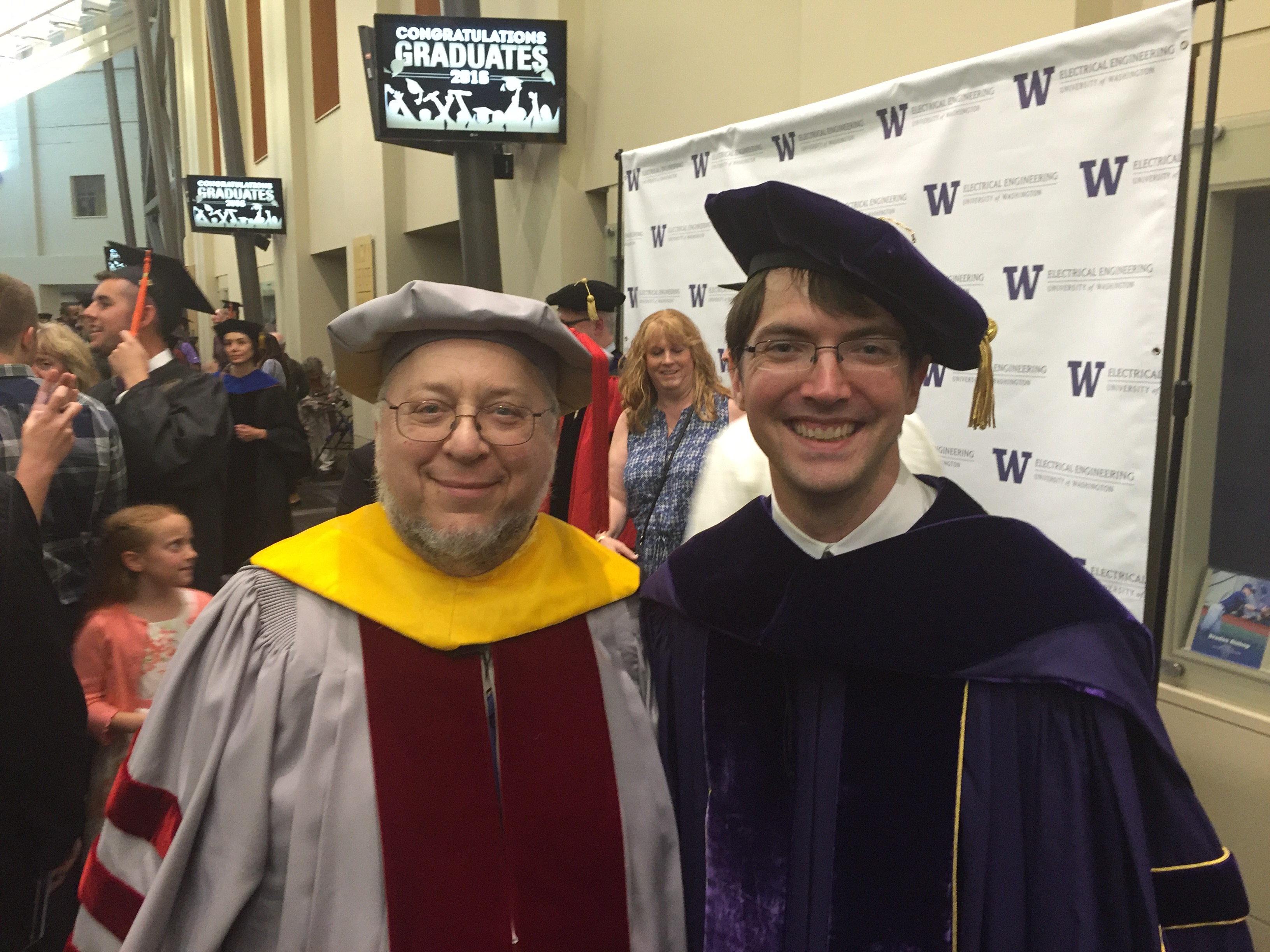 Congrats to the recent BRL graduate, Jeffrey Herron! He completed his PhD on closed loop deep brain stimulation with Dr Howard Chizeck. He is now working at Medtronic in Minneapolis, MN.
Congrats to the recent BRL graduate, Jeffrey Herron! He completed his PhD on closed loop deep brain stimulation with Dr Howard Chizeck. He is now working at Medtronic in Minneapolis, MN.
Volitional DBS control featured in Medtronic video

Medtronic has released a video featuring the work of Jeffrey Herron, Dr Howard Chizeck, and neurosurgeon collaborator Dr Andrew Ko. Their new deep brain stimulation hardware can sense neural signals as well as stimulate. Jeffrey has used their system to modulate stimulation and lay the groundwork for further volitional control. Read the article here and watch the video below.
Thank you Summer 2015 Researchers!
Over the last couple months the BRL has hosted some great summer researchers. We hosted several undergraduate and two local high school teachers who worked side-by-side BRL graduate students and faculty on advancing some of the lab’s ongoing projects. The topics that they worked on included from the neuroethics of DBS for depression, new password methods, and including haptic feedback into BCI tasks. They all produced excellent work over the summer and we wanted to take the opportunity to highlight their accomplishments here. A big thanks goes out to our summer researchers for dedicating so much time towards advancing the lab’s research!
Hale Soloff, an under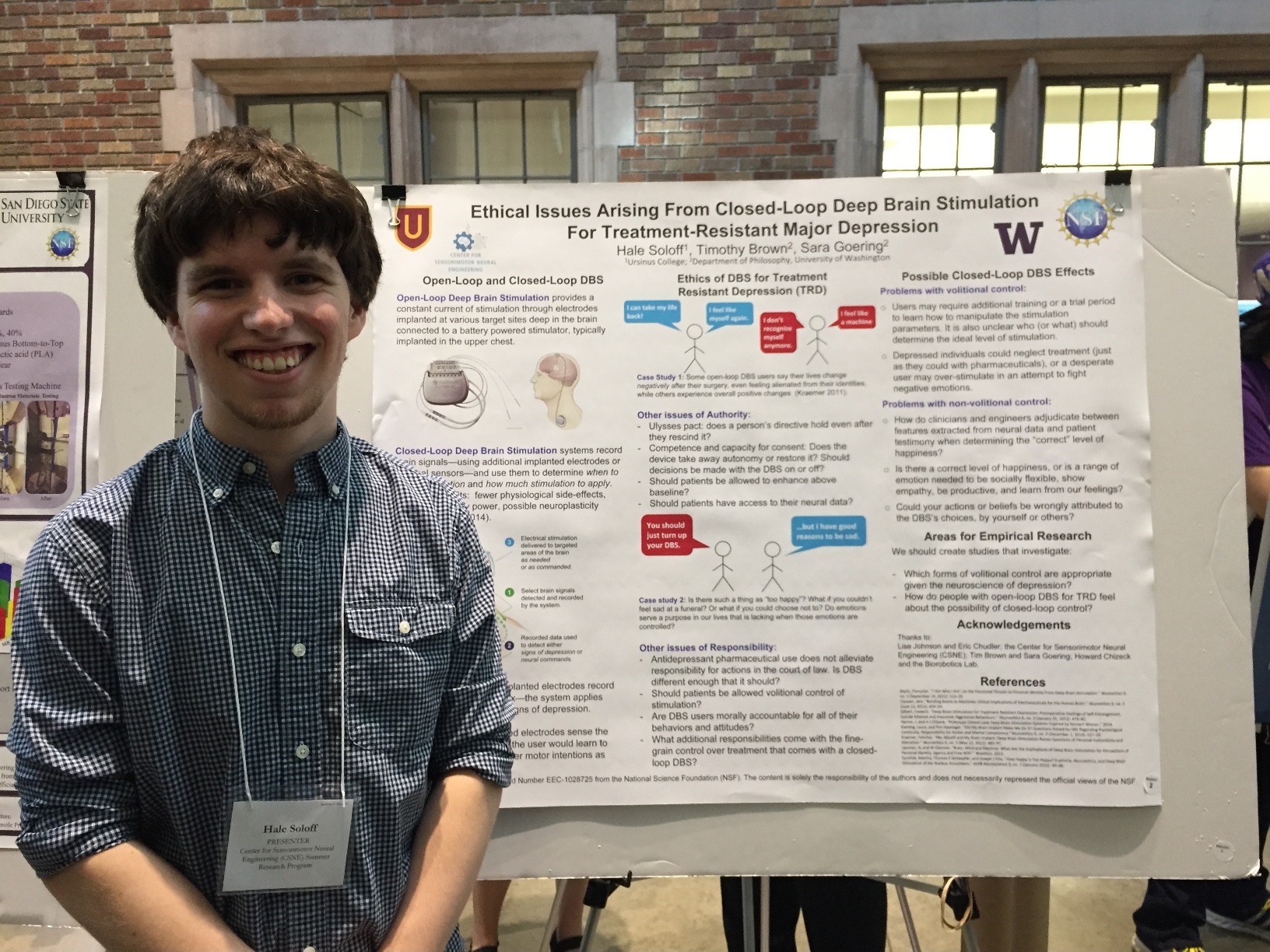 graduate neuroscience research student from Ursinus College, joined the Neuroethics thrust at the Center for Sensorimotor Neural Engineering’s Research Experience for Undergraduates (REU) program (more information here). He teamed up with the BioRobotics Laboratory to analyze ethical issues surrounding the use of new closed-loop deep brain stimulation (DBS) technology for the treatment of depression.
graduate neuroscience research student from Ursinus College, joined the Neuroethics thrust at the Center for Sensorimotor Neural Engineering’s Research Experience for Undergraduates (REU) program (more information here). He teamed up with the BioRobotics Laboratory to analyze ethical issues surrounding the use of new closed-loop deep brain stimulation (DBS) technology for the treatment of depression.
Acknowledging a gap in the literature of how deep brain stimulation affects moral understanding, Hale tackled questions of authority and responsibility; can someone with DBS be held accountable for all of their actions, or does the device exert undue influence on behavior, attitudes, and decision making? Does the device take away its user’s capacity for consent and free will, or does it restore that capacity which the depression took away? How much control should patients with depression have over their own DBS, and thereby their own emotions? Is there such a thing as the “correct” level of happiness, and does the patient, clinician, policy maker, DBS engineer, or somebody else get to make that decision? And finally, how does a closed-loop stimulator, which can record and analyze brain activity to adjust stimulation accordingly, change the answers to these questions? Hale was guided by mentor Tim Brown and PI Sara Goering in studying the moral discussions surrounding open-loop DBS, and by working closely with Dr. Howard Chizeck and the BioRobotics Lab to learn more about closed-loop DBS he raised new relevant questions as to how this technology affects its users and those around them.
Hale says about his research, “The way the public and media perceive new medical technologies like closed-loop DBS is very important. Exploring these questions is the first step to educating future patients, clinicians, and lawmakers about how these devices work and affect us.”
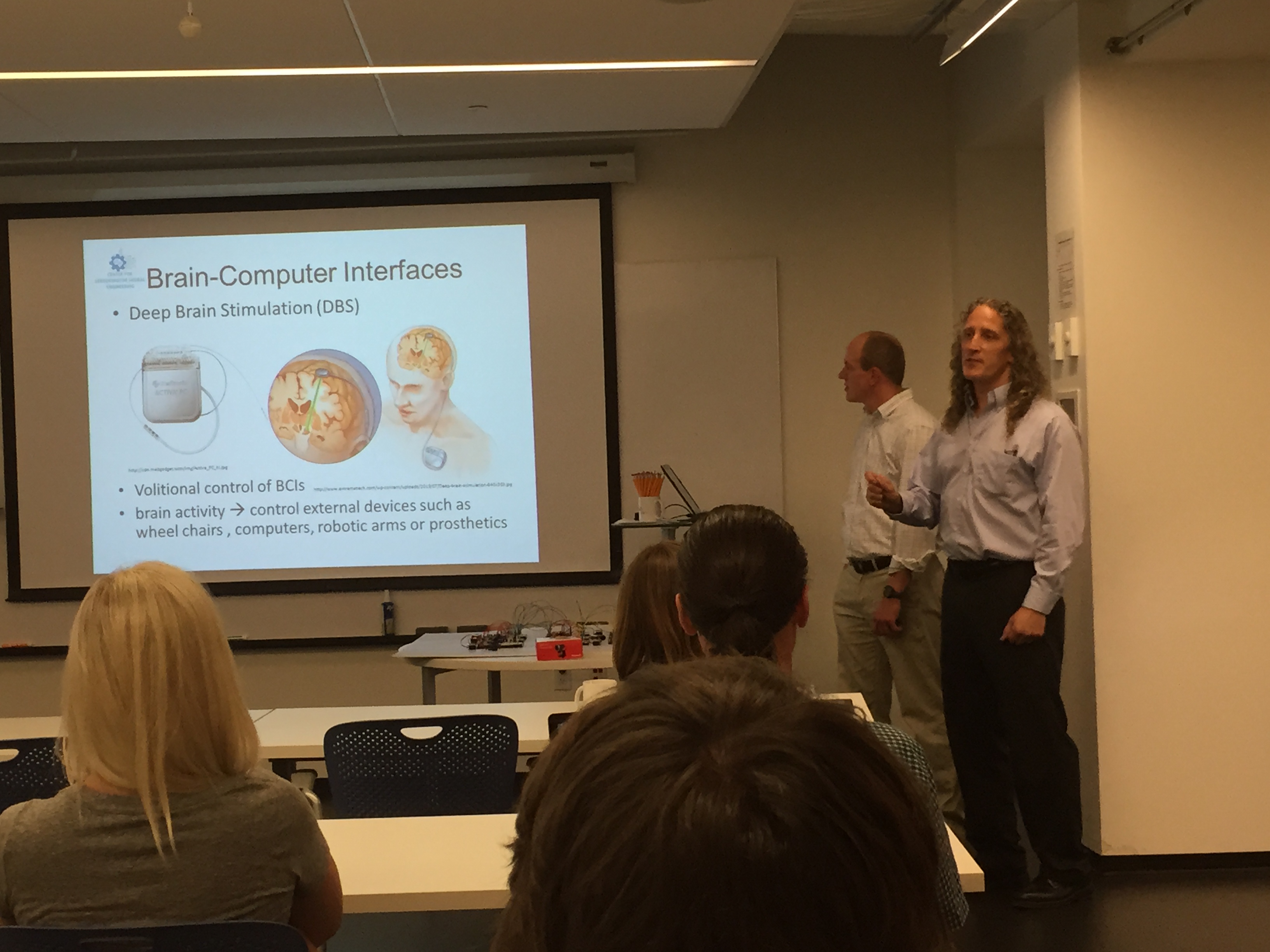 Two local high school teachers went back to school this summer in the BioRobotics Lab. Larry Bencivengo, a veteran Biology teacher from Mercer Island High School, and Paul Zimmer, who teaches Chemistry at South Kitsap high school, spent 7 weeks in the BRL as part of CSNE’s Research Experience for Teachers (RET) program. Bencivengo and Zimmer were part of a cohort of 6 teachers who worked part time in one of the labs associated with CSNE while also developing curriculum which they will pilot in their classrooms this school year. Read more about the CSNE RET Program here.
Two local high school teachers went back to school this summer in the BioRobotics Lab. Larry Bencivengo, a veteran Biology teacher from Mercer Island High School, and Paul Zimmer, who teaches Chemistry at South Kitsap high school, spent 7 weeks in the BRL as part of CSNE’s Research Experience for Teachers (RET) program. Bencivengo and Zimmer were part of a cohort of 6 teachers who worked part time in one of the labs associated with CSNE while also developing curriculum which they will pilot in their classrooms this school year. Read more about the CSNE RET Program here.
The task that these two “teacher-students” took on relates to ongoing research in the BRL, led by doctoral candidates Jeffrey Herron and Margaret Thompson, to train patients to gain greater control of BCIs such as Deep Brain Stimulators used to suppress Parkinsonian tremors. Zimmer and Bencivengo attempted to incorporate haptic feedback into a BCI training program developed by Herron and Thompson by using the Phantom Omni haptic mouse. They were successful in learning to incorporate haptic properties into Unity, the game development platform that Thompson and Herron used to develop the current version of the BCI training program. The virtual sense of touch provided by the Phantom Omni promises to improve patient performance in BCI training. Thanks to the research at BRL, these training programs may soon be used to help patients learn to control a computer mouse or other external device with their BCIs, and may eventually allow patients to exert volitional control of their DBS devices.
Zimmer traveled two hours each way back and forth from his home in Port Orchard in order to participate in the RET program. Bencivengo said, “The past 7 weeks working in the BRL have been among the most exiting and challenging of my teaching career – I can’t wait to get back into the classroom this fall to share all of the amazing things that I learned this summer! I can’t express adequate thanks to Dr. Chizeck and all of the amazing people at the CSNE and BRL for this incredible opportunity!” You can read more about our ongoing closed-loop DBS and BCI work here.
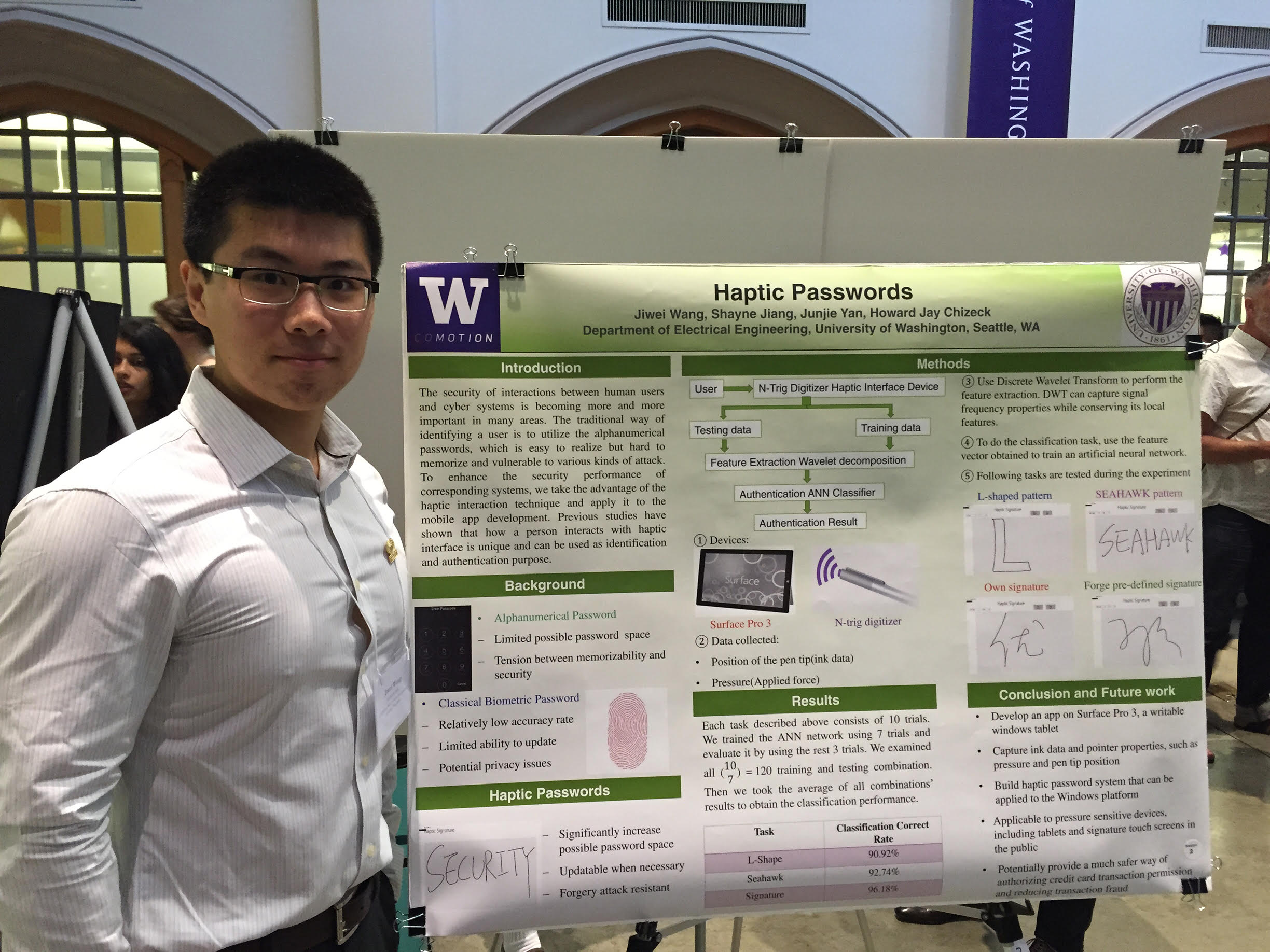 Jiwei Wang, a CoMotion Mary Gates Scholar from the University of Washington, worked in the BioRobotics Laboratory as an intern (more information here) . He worked with Junjie Yan and Jiang Shayne on the Haptic Passwords project, in which they built an app using the haptic password system that can be applied to the Windows platform.
Jiwei Wang, a CoMotion Mary Gates Scholar from the University of Washington, worked in the BioRobotics Laboratory as an intern (more information here) . He worked with Junjie Yan and Jiang Shayne on the Haptic Passwords project, in which they built an app using the haptic password system that can be applied to the Windows platform.
They realized that the security level of the interactions between human users and cyber systems is becoming more and more important in many areas. The traditional way of identifying a user is to utilize the alphanumerical passwords, which is easy to realize but hard to memorize and vulnerable to various kinds of attack. To enhance the security performance of corresponding systems, we take the advantage of the haptic interaction technique and apply it to the mobile app development. Previous studies show that how a person interacts with haptic interface is unique and can be used as identification and authentication purpose. We applied this technique to different platforms and found that the Surface Pro 3 was the best suitable device. One of the key reasons was that its pen, the N-trig digitizer, provided us with its API and made it easier to transfer data to the haptic password system. By developing an app on a writable windows tablet, we successfully capture ink data and pointer properties such as pressure and orientation. Then, we invited subjects to take specific tests, and after data analysis, we found that this system is solid and secure because of its good performance and forgery attack resistance. Additionally, this system is so user friendly that it not only is easy to learn, but also provides a complex but intuitive way of creating signature passwords. This haptic interaction technique can be applied to those pressure sensitive devices, such as tablets and signature touch screens in the public. This could provide a much safer way of authorizing credit card transaction permission and reducing transaction fraud.
As a full-time intern, Jiwei spent a lot of time in the BioRobotics Lab. Jiwei said, “This lab is amazing! People are all really professional on their projects and are always willing to help. Many many thanks to Dr. Chizeck’s patience and help! This is my best summer research experience and I’m looking forward to work with all of you in the future!”
UW Today Article Features BRL Research into Deep Brain Stimulation
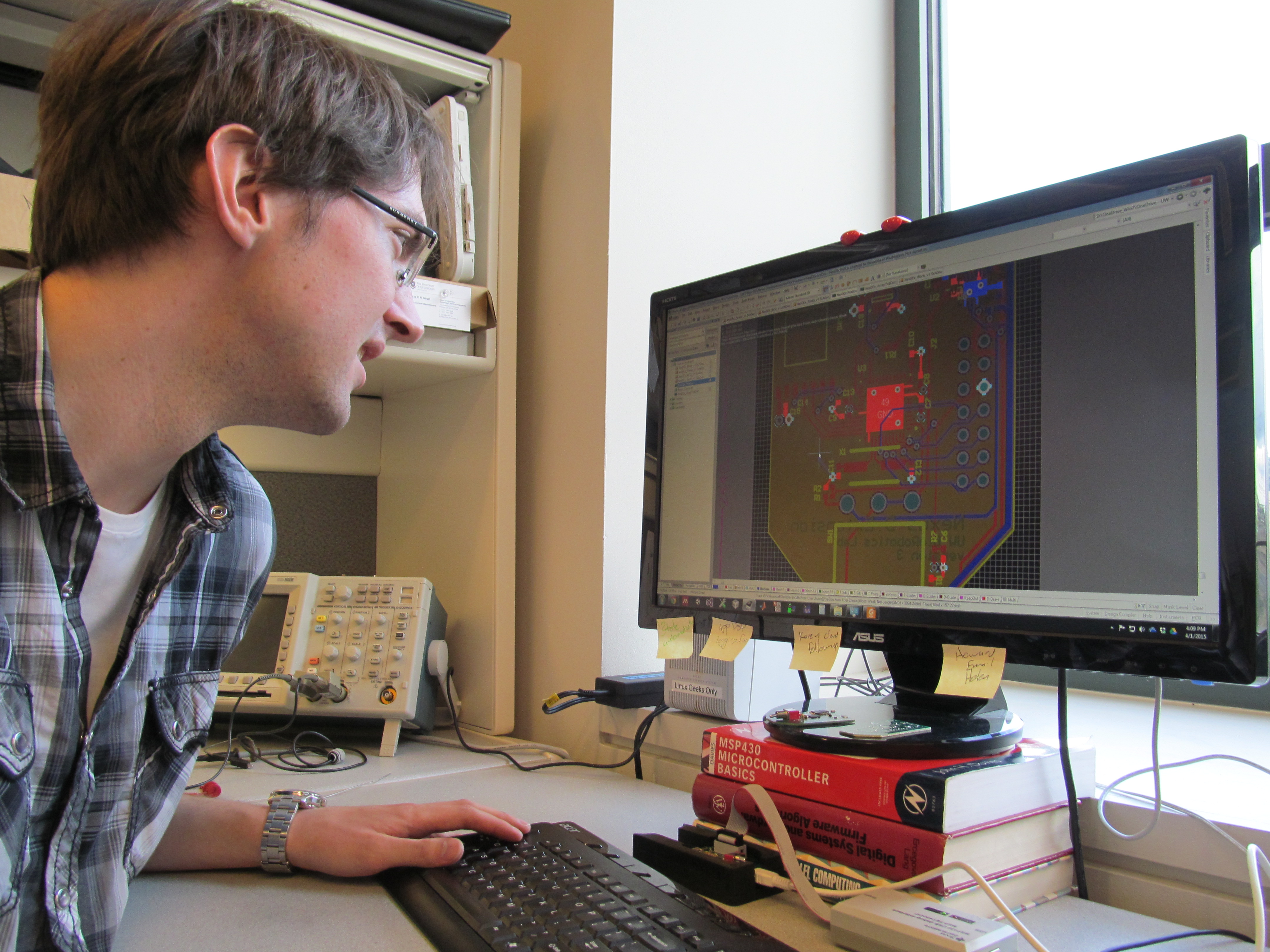 The UW Today website posted an article today that covers our ongoing work into researching closed-loop and volitional deep brain stimulation (DBS) techniques. In particular it describes our usage of the Medtronic Activa PC+S Deep Brain Stimulator as a research platform for use with Essential Tremor patients. Check out the full article here
The UW Today website posted an article today that covers our ongoing work into researching closed-loop and volitional deep brain stimulation (DBS) techniques. In particular it describes our usage of the Medtronic Activa PC+S Deep Brain Stimulator as a research platform for use with Essential Tremor patients. Check out the full article here
BRL Contributes two papers to We Robot 2015

We Robot posted the papers to be discussed next week at upcoming conference at the University of Washington. The conference deals with various ethical and legal issues surrounding near-future technologies. The BioRobotics lab contributed two papers to the conference that refer to our ongoing work in teleoperation security and closed-loop DBS systems. We are really looking forward to seeing what discussions these papers generate!
Feel free to read the papers or watch the panel discussions from the conference which have been published online at the below links-
BRL attends Deep Brain Stimulation Think Tank
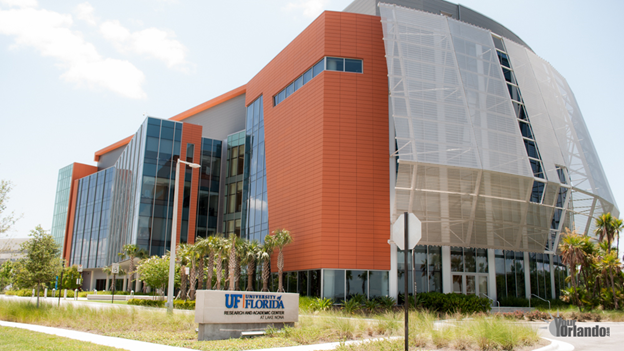 Last week, BRL researchers Jeffrey Herron, Maggie Thompson, Brady Houston, and Prof. Howard Chizeck attended the third annual DBS Think Tank in Orlando, Florida. Our collaborator Dr. Andrew Ko from the UW Medical Center also joined us in this trip to discuss cutting edge research into improving DBS therapy. Howard Chizeck presented our ongoing work to build engineering tools to enable research into closed-loop and volitional control of DBS therapy. We aim to use these tools collaboratively to accelerate development of advanced DBS systems across multiple institutions. Thank you to the organizers for putting together such a great event!
Last week, BRL researchers Jeffrey Herron, Maggie Thompson, Brady Houston, and Prof. Howard Chizeck attended the third annual DBS Think Tank in Orlando, Florida. Our collaborator Dr. Andrew Ko from the UW Medical Center also joined us in this trip to discuss cutting edge research into improving DBS therapy. Howard Chizeck presented our ongoing work to build engineering tools to enable research into closed-loop and volitional control of DBS therapy. We aim to use these tools collaboratively to accelerate development of advanced DBS systems across multiple institutions. Thank you to the organizers for putting together such a great event!